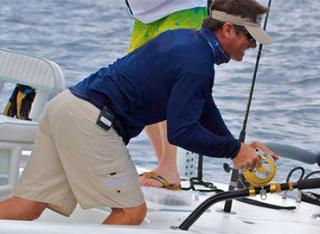There are so many of us that view boating and especially sportfishing as a great way to spend time on the water, but there’s a pretty good chance that if you do it very often you’ve probably had to deal with some type of annoying back pain. If so, you’re not alone. Many sport fisherman (and women) feel it by the time they get home, especially the following day. Hours of standing basically in the same position on the boat combined with heavy lifting, repetitive motions, can cause muscle fatigue, undue stress and tension in the lower back which can lead to painful back injuries to fishermen.
As many sportfishing men and women know, a typical day includes an early wake up that comes when most people are still sound asleep. And then there’s the job of lugging ice, tackle, packed coolers and an assortment of accessories to your boat. Lifting large and/or heavy items to the boat as well as in and out of the water is strenuous work, but unlike athletes, we don’t stretch and warm up, and that’s where the problems begin.
Don’t be fooled into thinking that only sportfishing causes lower back pain from being knocked around by high waves or chasing big fish. A Duke University study revealed that 69-percent of fly fishermen also reported back pain, which leads us to believe that it’s not always about how rough the ocean is or how big the fish is. Repetitive motion, also called overuse syndrome, as well as casting mechanics to achieve accuracy can be enough to bring on the pain. If you happen to be a “weekend warrior,” and are sedentary all week, you are more susceptible to back pain and injury. You simply can’t throw yourself into grueling conditions and activities that your body isn’t accustomed to, because if you do your body will let you know in the form of pain and injury. So keep in mind that a little extra precaution can help alleviate lower back pain and even help you feel great after a successful sportfishing trip.
Believe it or not, a lot of people prefer to go sportfishing in flip-flops or boat shoes, but neither of these provides the support your body and feet need for long days on the water. Flip-flops in particular provide poor arch support, which can lead to pain in your feet and knees, decreasing stability for your lower back.
You should always stretch at least five minutes worth of stretching before you get on the boat, as well as at mid-day if you begin to feel stiff, can make such a tremendous difference at the end of the day. Strong core muscles, such as abdominal and lower back muscles, are key to preventing back injuries, so it’s important, and makes perfect sense, to keep your body in top shape all year long. Crunches, sit-ups and leg lifts are great yet simple exercises that can help you develop a very strong core. What should be avoided at all costs is sitting all day on a boat. You should also consider how you lift heavy objects like coolers, bait, etc. Always bend at the knees and never lift heavy objects with just your back.
Staying hydrated while sportfishing can help prevent cramping. It’s obvious that fishing in rough waters can aggravate existing back pain, so if you know conditions will be deteriorating throughout the day and you don’t feel quite up to par, maybe you should skip going out, and stay dockside. Hard slams from boats re-entering the water can aggravate pre-existing spinal problems and create a real issue that may require surgery later on. If you can’t fight the urge to head out into that beautiful sea, sitting on a beanbag in the transom can help alleviate stress in rough waters.
As a sport fisherman, it’s important that you are in good physical condition and are using the correct equipment for the task at hand. Remember, you should be fighting fish, not heavy tackle. Unfortunately, as we get older existing pains do become more noticeable, but they shouldn’t keep you from the activities you enjoy the most, like sportfishing.
